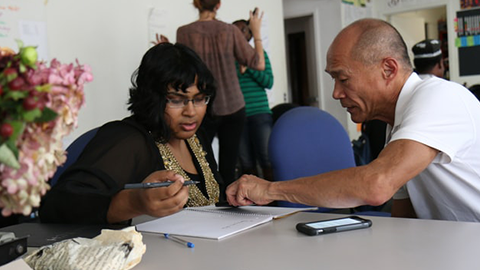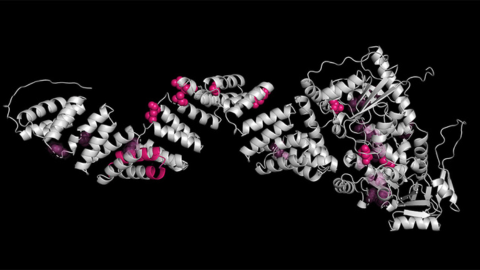How mentors make an impact on your career
Finding a career that aligns with your values, skills and interests, among other things, is a challenge. Deciding to go into industry, academia, government or another sector can be overwhelming. Having a mentor makes this process run more smoothly, especially if you are at a transition point and don't know where to start.

January is National Mentoring Month, and yesterday was Thank Your Mentor Day, so today I'm going to cover how mentors make an impact on your career. No matter where you are on your path, a mentor can help you.
According to a guide for mentors made by the National Academies of Sciences, Engineering and Medicine, mentoring is a personal and professional relationship that develops over time. A mentor is a person who:
- takes special interest;
- offers guidance, knowledge, support and feedback; and
- shares experiences to help the mentee develop into a successful professional.
Ideally, a mentor should be a person in your field or the field you are exploring. There is no one-size-fits-all when it comes to mentoring.
How mentors make an impact on your career
1. They help you determine what your dream career looks like.
Go deep into this. What particular part of science are you passionate about? What is your ideal work environment? What is your favorite skill? These are just a few questions you should ask yourself before you meet with your mentor.
The myIDP and the book "What color is your parachute?" are good career-assessment tools to help you reflect on what your dream career might look like.
(Career outcome: Narrow down your career options.)
2. They hold you accountable.
A good mentor is a strong accountability partner. Your mentor will make sure you are taking the right steps to achieve your goals in a SMART (specific, measurable, action-oriented, realistic and timely) fashion. If there are hurdles, you and your mentor can develop a game plan so that you can redefine your goals.
It is important to be open and honest with your mentor, especially when you are in a transition or when you’re not sure what you want to do. Your mentor’s goal is to help you achieve your goals, so you can grow as a professional.
(Career outcome: Develop a realistic action plan.)
3. They offer different perspectives.Marketing yourself as a scientist means going beyond your technical skills. A mentor can help you showcase your transferable skills to connect with potential employers and help you explore career options.
If you are interested in exploring careers ourside of the academy, make sure you have a conversation with your mentor. Some mentors are not on board with “alt-ac” careers. If your mentor does not agree with your career goals, you need to find a new one. Mentoring is a two-sided relationship, and communication is key. No one wants to be left in the dark, especially your mentor.
(Career outcome: Identify options and access new networks.)
4. They keep you motivated and help you through difficulties.
A mentor wants to see you succeed and to make sure you are remembering your “why.” They have experience and knowledge to help you through rejections and pitfalls and can give you meaningful feedback.
(Career outcome: Establish a strong support system.)
How to be a better mentee
Now that you know how a mentor can help you, here's how you can be a better mentee.
The National Research Mentoring Network has tons of training, webinars and resources for all things mentoring. Here are some quick tips that you can start using today.
- Be respectful of your mentor’s time.
- Define your expectations.
- Offer to help your mentor.
- Thank your mentor.
- Pay it forward by being a mentor.
For more information on mentoring, check out the ASBMB's Mentoring Matters webinar.
Enjoy reading ASBMB Today?
Become a member to receive the print edition four times a year and the digital edition monthly.
Learn moreFeatured jobs
from the ASBMB career center
Get the latest from ASBMB Today
Enter your email address, and we’ll send you a weekly email with recent articles, interviews and more.
Latest in Careers
Careers highlights or most popular articles

Upcoming opportunities
Friendly reminder: May 12 is the early registration and oral abstract deadline for ASBMB's meeting on O-GlcNAcylation in health and disease.

Sketching, scribbling and scicomm
Graduate student Ari Paiz describes how her love of science and art blend to make her an effective science communicator.

Embrace your neurodivergence and flourish in college
This guide offers practical advice on setting yourself up for success — learn how to leverage campus resources, work with professors and embrace your strengths.

Upcoming opportunities
Apply for the ASBMB Interactive Mentoring Activities for Grantsmanship Enhancement grant writing workshop by April 15.

Quieting the static: Building inclusive STEM classrooms
Christin Monroe, an assistant professor of chemistry at Landmark College, offers practical tips to help educators make their classrooms more accessible to neurodivergent scientists.

Unraveling oncogenesis: What makes cancer tick?
Learn about the ASBMB 2025 symposium on oncogenic hubs: chromatin regulatory and transcriptional complexes in cancer.

